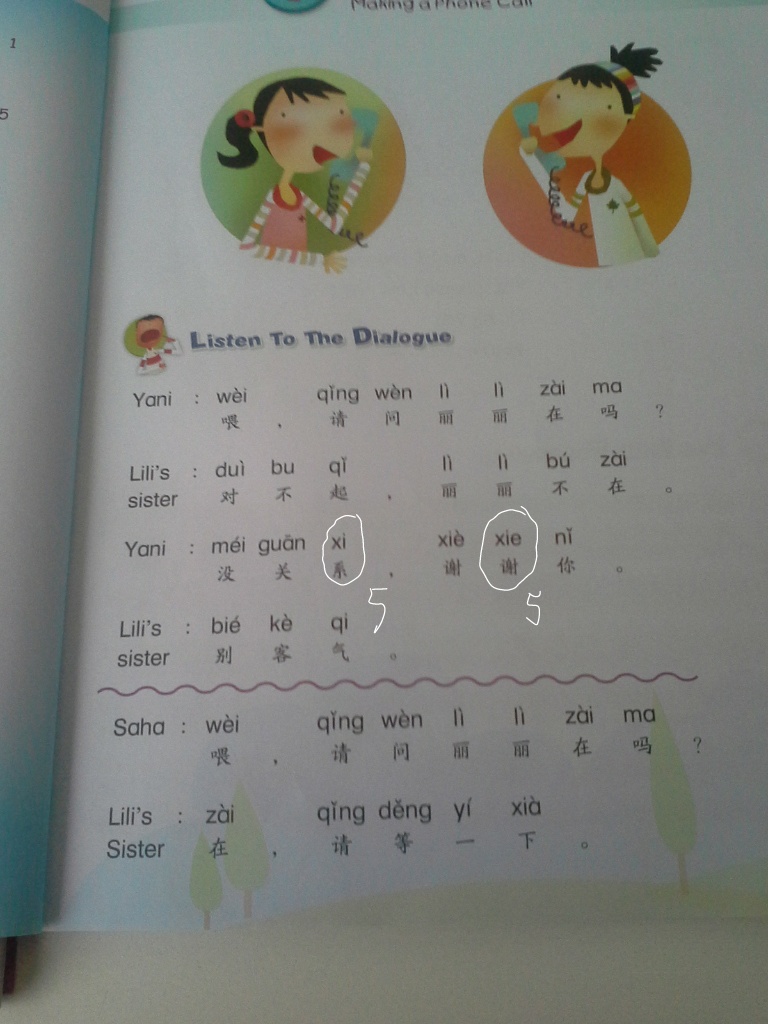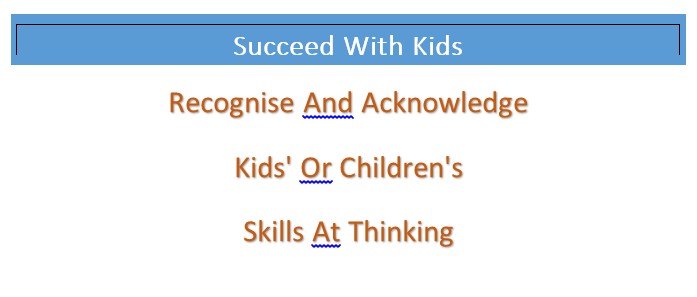I always learn new things about kids when I am teaching them. I learnt that kids’ thinking skills are valuable. Recognise and acknowledge their skill at thinking, and you will gain their co-operation and participation.
I was in class last week teaching a group of about 15 students Chinese Conversation. A handful of students have not studied Chinese, but a majority of them had already learnt some basic.
For the first half hour, I taught Han Yu Pin Yin or the Chinese phonetical symbols.
The 5th tone is called the silent tone, so it is left blank. Blogpost: Recognise and acknowledge kids’ thinking skills
The activity given was to write the number corresponding to the tone indicated by the strokes. I had projected the page on the whiteboard using the projector. The following is a copy of that page projected on the whiteboard.

Source: Conversational Chinese Basic 1 (Marshall Cavendish) 华语会话 (基础) ,名创教育 Recognise and acknowledge kids’ thinking skills
All the students except one girl had their turn. Now she was left with two characters that used the silent tone. She stood in front of the board not knowing what to do, staring at the blank space. It is easy to spot 1, 2, 3 and 4. But number 5 seems difficult for her. Her intuition didn’t lead her to the answer. I turned to the class for support.
One after another the clues were thrown at her. “The number after 4 and before 6.” “What number comes after 4?” “It is the number just before 6.” The girl just could not find the answer in her head.
I began to feel a sense of worry for this girl. It was not because she was not able to count or anything. She couldn’t understand the clues or she was fixed on getting the answer she could not listen to the clues. But eventually she did, after 3 minutes and lots of clues.
I turned to the class and told them that they were all very clever. They looked puzzled by my reaction. I said, “For you to come up with the clues and not tell her the answer, that is very clever of you! It shows you know your sequence. 2,4,6,8… ” I kept on talking about sequence in Mathematics for a bit. Then I said to them to give each other a big high 5.
“Has anyone told you how clever you are?” I asked
“No.” One said. Another shook his head. And another looked at him and nodded in agreement.
I noted that even though this had nothing to do with Chinese Conversation, I wanted them to connect with their own cleverness and recognise that they did all the thinking, not I.
Because I wanted them to see results in my class, I needed to work on the positive. The way I do this is to validate their strengths.
Stop The Battle 1… With Your Parent
I do not always get recognised for how clever I think. What my mum wants is just results. If I don’t get good results, I must be lazy or influenced by lazy people. If I get good results, I am intelligent. It seems hard for her to be positive about anything I think about. I am always different, and so she probably can’t relate to that difference anyway. But she knows I am clever. She constantly battles with thinking issues, even to this day. I love her but growing up with her was like taking instructions after instructions endlessly. I work fast and smart, so I get picked on to do house work and cooking. I don’t think, I just do because mum says so. Even when I failed in one exam paper, she couldn’t tell me I should take it easy. To be fair, life has always been hard for her. She didn’t stop battling hardship by taking it easy herself. She did not know how to give value to the way I think. Therefore it slowed down my progress.
Adults are constantly battling against one another about thinking issues. “Oh no! I didn’t mean it that way.” “What are you thinking? That thing is hot!” “What in the world is that? ” People seem so surprised whenever they get surprises. So we let our children listen to our battles and eventually, they become the unwilling participant.
I see no point in trying to fight a losing battle with my subconscious mind. I am ready to arrest and actually control the negative thoughts. I no longer require internal dialogue to prevent something so simple as thinking to stop me from taking action.
If you want to succeed, stop the battle , walk away from another person’s voice in your mind which says you are not good at what you do or think. Then take positive steps to help others the way you know will impact their lives positively.
Stop The Battle 2…With Your Students
Kids generally do not understand that thinking is a private activity. You know this when you have to keep telling them not to interrupt when you are quietly watching television, reading a book, staring at the ceiling or just simply laying down on the couch with your eyes shut. They can come to you at any time without first knocking on your door, analogously speaking that is.
Educating them about thinking is one of the toughest thing to do on earth. What to think about and how to think about thinking.
I find it hardest to tell children that I am thinking when I have a pen in my hand. Doing something is an activity, thinking is not. It is private. I find it easiest to show that I am thinking by placing one hand on my chin. I pause to breathe and will say nothing for a few seconds. Then I look at the child and respond, “Yes?” Another way is to tell them that I am thinking but in the process of saying this, I forget what I want to think about. Not an option. So I stick with the hand on chin method or the gentle respond, “Yes?”
Recognise and Acknowledge
There are only two groups of adults children care to have respect for, their parents and teachers. Elder siblings are always playmates first, siblings second. It is easier for teachers to work with kids who have been praised for their skill at thinking out loud. They do not need to be acknowledged, they have already progressed. They work on their knowledge.
Take a conscious effort to recognise and acknowledge kids’ and children’s thinking skills. It is as much habit forming as thinking itself. For children to be congratulated for a clever thought, it will impact on their progress. They need to feel recognised for their small skills because this will lead them to learn bigger skills.
Kids respect their teachers and therefore in the classroom, the teacher need to receive the respect by recognising their strengths. Acknowledging kids for their skills at thinking will always motivate them to participate more actively in class.



very interesting! I used to teach English to kids, here in Spain. I notice that they just let it flow and do not define themselves the same way that their parents might do (” I am too old to learn, I am going to make mistakes”).
So, do you teach Chinese?
Best regards from Spain,
Marta
Hanifa, being a father of 2 amazing children, I am thankful to have teachers like yourself leading the way. Each child is different and ensuring our expectation do not get in the way of their development is important. Well written article, thank you!
Hi Hanifa, love this blog, too many people seem to forget that children need poitve reinforcement all the time, they think that because they are always on the go smiling and happy that they don’t need to be told how good they are.
Yes. I hate to take their smiles off their faces but sometimes the demands of the school programme do not allow these smiles to keep on lighting up the classroom. They still need to study very hard to pass exams. So I try to always validate what they share in class. I am not working full time with these kids, if I do, I think I will have sleepless nights thinking for them.
Thank you Aaron. You said, “2 amazing children.” Keep saying that word, amazing. I do admire English speakers who use adjectives like these to describe their loved ones. It melts my heart. In Malay, it is hard to place the adjective before the noun. “Dua (2) anak (children) yang cerdik (that are smart).” So we apt to leave it out. 🙁 I should do that next time I speak about my child. Thank you. This is a very important discovery.
Hi, Marta. Yes, I started to teach Mandarin formally now. I am so grateful for my sister who brought me back into the teaching line. I wanted to use my Mandarin more than English. Due to my race, Malay, it is a challenge to be accepted. So I studied to be good at the language again. The intention was to help my daughter. I could not teach Malay to her although I speak the language. The journey brought me to this point.
I really appreciate your way of thinking Hanifa! It’s so wonderful to imagine praising children for the way they think. I don’t have children of my own but I so get how easy it is to only receive praise when we finish something, or receive good marks, or even an award. Often parents seem to want tangible results, as you say, before they even consider praising. Lovely, and so validating, to honour whats going on inside their heads. I do this with adults too.